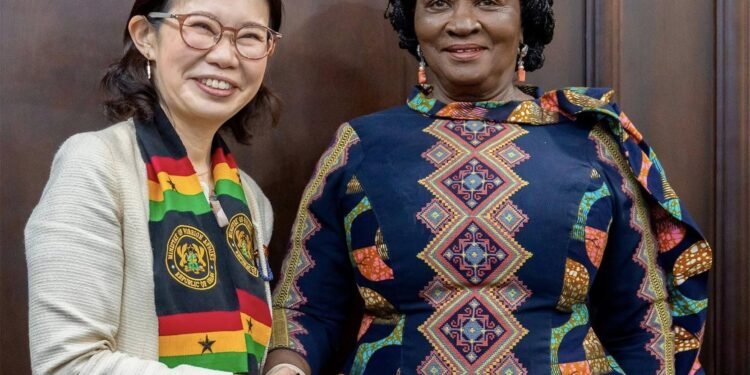The IMANI Center for Policy & Education (IMANI) has submitted a petition to the Commission on Human Rights and Administration Justice calling for an investigation into the conduct of the Electoral Commission (EC) of Ghana regarding the retirement and disposal of elections-related equipment.
In a detailed statement released to the public, the renowned policy think-tank raised deep concerns over what it perceives as misappropriation, wastage, and misuse of national resources by the Electoral Commission of Ghana.
“We write to invoke the jurisdictions, powers, mandates, and duties under chapters 18 and 24 of the 1992 Constitution of the Republic of Ghana, which entrust the care of national resources and the charge of ensuring sound conduct among public officers to the Commission on Human Rights and Administrative Justice (CHRAJ). We also refer to section 7 of Act 456 in this same regard”.
IMANI Center for Policy & Education
The petition highlighted a series of perceived troubling actions by the EC, particularly concerning the procurement and disposal of crucial electoral infrastructure.
According to the policy think-tank, the controversy stems from the EC’s decision in 2020 to procure a new set of equipment, software, and ancillaries to replace existing technological infrastructure used in public elections, including biometric verification devices (BVDs), biometric voter registration kits (BVRs), ABIS software, and databases/datacenters.
IMANI Africa in its petition to CHRAJ strongly posited that the EC’s claim of obsolescence regarding the existing equipment is unfounded, pointing out that the portfolio of BVMS components dates from different points in time, with some devices purchased as late as 2018 and 2019.
The IMANI Centre for Policy and Education’s petition thus invoked constitutional provisions and legal frameworks, asserting that the EC’s actions may amount to a breach of public trust and accountability.
The organization expressed grave concern over the EC’s handling of the country’s resources, particularly in its procurement and disposal processes related to electoral equipment.
The organization also asserted that the EC’s past practice had been to replace faulty or outdated components rather than discarding entire sets, as was done in the 2020 procurement.
The petition recounted that the Electoral Commission’s procurement process itself was marred by controversy, with allegations of bid-rigging, manipulation, and preferential treatment.
The policy think-tank further alleged in its petition that the controversy surrounding the Electoral Commission’s procurement process led to the resignation of a Chair of one its procurement cycle.
Additionally, the petition highlighted that the procurement of the Electoral Commission’s ABIS software was shrouded in considerable secrecy coupled with a lack of transparency and potential cost inflation.
Furthermore, the IMANI Centre for Policy and Education’s petition recounted that the situation escalated in 2024 when it discovered thousands of BVMS components at a recycling plant in Accra owned or operated by a company called Electro Recycling Ghana.
This revelation per the petition prompted the policy think-tank to question the EC’s disposal methods, raising suspicions of attempts to suppress inventory records and evade accountability.
Given the above, the policy think-tank accused the EC of prioritizing commercial interests over responsible stewardship of public resources, alleging a breach of the code of conduct for public officers and potential corruption.
The policy think-tank also posited that the EC’s conduct in regarding the procurement of new electoral equipment falls short of the standards expected of a constitutional body responsible for managing electoral systems and public finances.
The petition thus called for a thorough investigation into the EC’s actions and emphasizes the need for accountability and transparency in the management of electoral processes.
Key Issues in the Petition
Key issues outlined in the petition shed light on what the IMANI Centre for Policy and Education perceives as systematic flaws in the EC’s handling of electoral equipment, raising serious doubts about transparency, accountability, and adherence to procurement regulations.
To begin with, IMANI Centre for Policy and Education questioned whether the electoral equipment deemed obsolete by the EC before the procurement of new systems in 2020 was uniformly outdated, suggesting that many components retained residual value and could have been refurbished or repurposed rather than discarded en masse.
Touching on perceived auction irregularities, the policy think-tank in its petition alleged that the EC’s auction of legacy equipment was marred by improper categorization and bundling, potentially enabling buyers to profit unfairly from valuable items sold at deflated prices.
IMANI Centre for Policy and Education also criticized the EC for failing to describe equipment accurately in auction listings, potentially misleading buyers and undermining the procurement process’s integrity.
On the suspected violation of procurement guidelines, the policy think-tank in its petition posited that the EC’s actions contravene the Public Procurement Authority’s rules for disposal, suggesting a disregard for guidelines aimed at ensuring transparency and fair dealing.
“The Petitioner categorically asserts that the EC’s action defies the aim of the said guidelines, which is stated as follows: ‘The aim is to achieve the best possible outcome by gaining the best available net return when selling and to ensure that Procurement Entities are even-handed, transparent and honest in all dealings’ (paragraph 1.2, Guidelines for Disposal of Goods & Equipment; 2019)”.
IMANI Center for Policy & Education
Moreover, IMANI Centre for Policy and Education vehemently asserted that the EC’s failure to accurately value legacy equipment may have led to an underestimation of its worth, potentially resulting in financial loss to the state.
The petition contended that the absence of effective classification, a lack of fidelity to the true “provenance” of different lots within the EC’s legacy BVMS portfolio, and similar problems with the approach to valuation, led to an underestimation of the original acquisition cost of the items, and of the appreciation in their lifecycle value over time due to refurbishments, which in turn led to the wrongful use of the “public auction” method rather than the “public tender” method.
Here, the petition further recounted that since the public tender method has more stringent criteria for the safeguarding of public resources, the EC’s conduct may have been necessitated by the need to avoid the transparency, Public Procurement Authority oversight, and stricter even-handedness required in public tenders.
The petition thus emphasized that the conduct of the Electoral Commission above constitutes an element of procurement abuse, corruption, and conflict of interest.
IMANI Centre for Policy and Education also questioned the selection process of the auction house, Sanidaso Mart, claiming that it is unable to confirm that the said auction house is duly registered with the Auctioneers Registration Board of the Ministry of Interior in Ghana.
In addition, the petition raised alarm over the handling of sensitive electoral data, alleging inadequate safeguards and improper disposal processes that may compromise voter privacy and security.
The petition stated that per IMANI’s correspondence with industry experts the removal of sensitive data from such sensitive items as the legacy equipment requires sophisticated processes only manageable by specialized entities with the capacity to ensure the complete non-recoverability of such data.
The petition thus alleged that whilst Electro Recycling Ghana Limited has permits from the Environmental Protection Agency in respect of the environmental impact and footprint of its work, it did not, at the time it received parts of the legacy equipment, have any relevant certifications, recognition, or partnerships with the likes of the Data Protection Commission, the Cybersecurity Authority, or the National Information Technology Agency that could have equipped it with capacity to ensure the safe handling of devices containing sensitive personal data of millions of voters as well as, in the case of the BVDs, voting verification data.
The petition also indicated that the aforementioned recycling company had no certifications from reputable auditing organisations attesting to its capacity to handle sensitive data.
The policy thin-tank thus expressed its willingness to establish beyond reasonable doubt in the course of CHRAJ’s investigations that the EC’s data erasure regime prior to the transfer of the legacy equipment to the winning bidder, and thereafter, did not satisfy best practice.

Further Details of Petition
In an additional detailed account, the IMANI Centre for Policy and Education raised critical questions and unveiled what it perceives as glaring contradictions and potential malfeasance within the EC’s handling of legacy equipment.
Here, the policy think-tank began by challenging the EC’s assertion that the legacy equipment, procured prior to 2020, was uniformly obsolete.
Per it petitions, correspondence from key suppliers contradicts the EC’s claims, suggesting that the equipment retained value and functionality beyond the EC’s characterization.
IMANI Africa further asserted that procurement activities post-2018, including refurbishments and maintenance, undermine the EC’s obsolescence narrative.
The IMANI Centre for Policy and Education in its petition to CHRAJ argued that successful electoral exercises conducted with legacy equipment by the Electoral Commission in 2018 and 2019 further challenge its claims of uniform obsolescence.
More so, IMANI alleged conflicts of interest within the EC, suggesting that certain officials and consultants stood to gain from the procurement of new equipment.
The petition alleged a lack of independent evaluation and assessment on the part of the Electoral Commission, which taints its decision-making process, raising concerns about impartiality and transparency.
The petition also indicated that IMANI’s analysis, supported by independent observers, contradicts the EC’s claims regarding the performance of legacy equipment.
“In the 2019 district elections, the last one during which the legacy equipment was deployed, CODEO recorded a 6.71% BVD failure rate (exhibit 6). 25. In the 2020 general elections, which featured for the first time the brand new BVMS of the EC, the BVD failure rate was 10.3% (Exhibit 6), significantly higher than comparative failure rates witnessed during the use of the legacy equipment in various previous elections.
“For example, in 2016, the BVD failure rate was less than 4% according to the European Union Observer Mission (Exhibit 7). Whilst CODEO reported a failure rate of 6% (Exhibit 6)”.
IMANI Center for Policy & Education
The petition thus posited that the failure rates and performance indicators of the EC’s pevious equipment during elections in 2018 and 2019 do not substantiate the EC’s assertion of obsolescence.
The IMANI Centre for Policy and Education concluded it petition by urging the Commission on Human Rights and Administrative Justice to engage in due-diligence in conducting thorough investigations, setting the records straight, prescribing the right corrective measures, and using the courts to compel right behavior if and where necessary.
It also underscored the importance of upholding democratic principles and the rule of law in safeguarding the integrity of Ghana’s electoral system.
READ ALSO: Ghana’s FDI Plummeted In 2023























